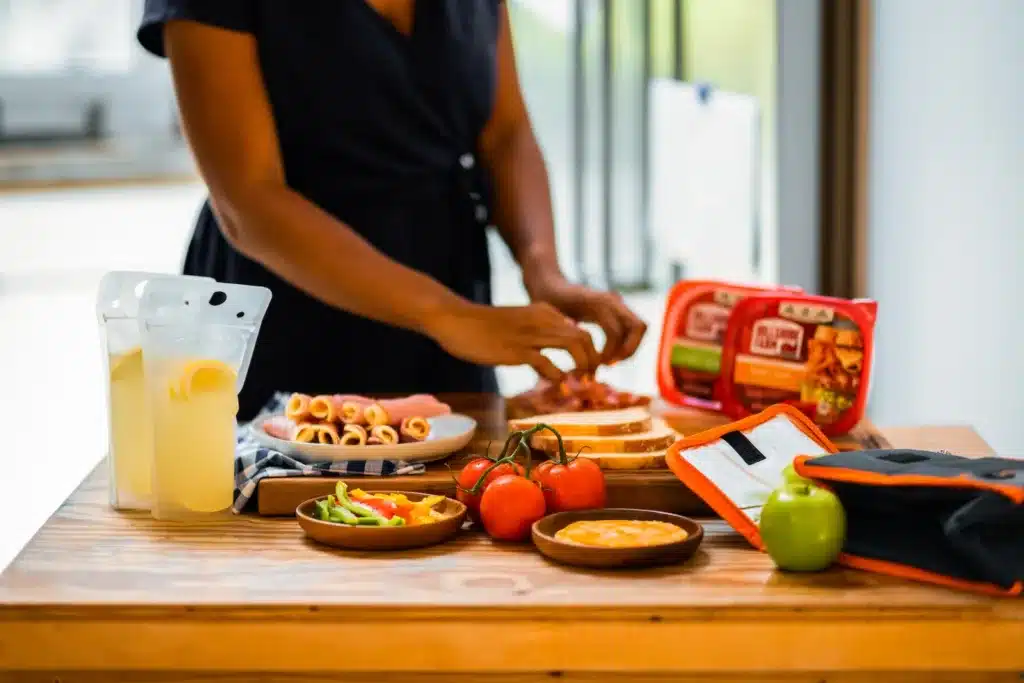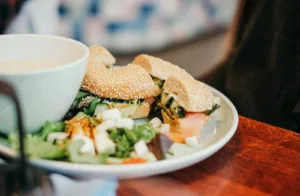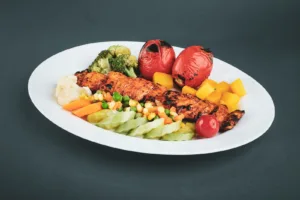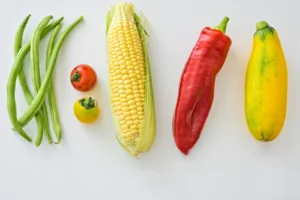Ready to start a 7-day vegetarian meal plan? This 1,500-calorie meal plan is a great way to start. It provides satisfying, nutrient-rich recipes to help you eat vegetarian for a week.
This meal plan can help reduce the risk of heart disease and diabetes, as well as aid weight loss.
Following this plan offers tasty meals and helpful preparation tips to set you up for success. It also allows you to experience the many benefits of plant-based eating.
With this complete vegetarian meal plan, you’ll learn how to build balanced menus and prep ahead. Discover new favorite recipes and the joy of vegetarian flavors. Take the guesswork out of nutrition with perfectly portioned meals.
Get ready to enjoy a week of wholesome, delicious vegetarian dishes. Cook once, and eat all week with handy make-ahead options. Gain skills to craft your healthy menus.
We’ll give you tips to stay on track and save time.
Here’s what you’ll get:
- Delicious and satisfying meals
- Lots of preparation
- A few great benefits!
Reap nourishment and wellness from nature’s bounty. Embark on the journey to better health!
Table of Contents
ToggleKey Takeaways
- A vegetarian diet reduces the risk of chronic illnesses like heart disease and diabetes and aids weight loss through nutrient-dense, low-calorie foods.
- A vegetarian diet also improves overall health and well-being.
- Prepping meal recipes in advance saves you time and money while setting you up for healthy, convenient meals all week long.
- Include balanced sources of plant-based protein like beans, lentils, tofu, and pesto quinoa to ensure you get adequate protein intake and essential nutrients.
- Plan out meals ahead of time and make grocery lists to stay on track throughout the week. Stick to nutritious whole-food ingredients.
- Try new flavors and recipes to stay motivated. Incorporate a variety of fruits, vegetables, grains, and plant-based protein in your meal plan.
- A 7-day, 1,500-calorie vegetarian meal plan supports weight loss in a healthy, sustainable way while providing nourishing fare.
7-Day Vegetarian Meal Plan: 1,500 Calories
Wondering about weight loss? This plan is expertly crafted to help you achieve your goals. Curious about the calorie breakdown? The 7-Day Meal Plan Breakdown section guides you through the distribution of calories, ensuring balanced nutrition.
If you want to go veggie, this 7-day, 1500-calorie meal plan makes it delicious and simple to eat plant-based for a week.
Discover tasty new recipes and reap the many benefits of vegetarian eating
With balanced nutrition and plenty of flavors, you’ll stay satisfied while learning to craft menus tailored to your needs. Take advantage of make-ahead options for grab-and-go plant-based fare.
Embark on the journey to better health with this complete weekly vegetarian plan! Try new dishes and customize them to your preferences.
Day 1 Meal Plan: 1,500 Calories
For Day 1 on the 1,500-calorie vegetarian meal plan, kick off your day with a nutritious breakfast of oatmeal, raspberries, and walnuts. This tasty mix offers a balance of carbs, fiber, and healthy fats to keep you energized.
To make the meal plan your own, swap the raspberries for other berries such as blue or strawberries. Or use almonds or pecans instead of walnuts. Pick nutrient-rich foods that fit within your calorie goals.
With just a few changes, you can customize the meal plan to suit your tastes and needs.
Day 2 Meal Plan: 1,500 Calories
Start Day 2 with a yummy breakfast of Baked Banana-Nut Oatmeal Cups and clementines.
Packed with protein, these oatmeal cups are simple to make and great for meal prepping. A great source of veggie protein, they add balance to a vegetarian meal plan. Here’s a 1,500-calorie veg meal plan for Day 2:
| Meal | Food | Calories |
|---|---|---|
| Breakfast | Baked Banana-Nut Oatmeal Cups and clementines | 300 |
| A.M. Snack | Raspberries with Greek yogurt and chia seeds | 150 |
| Lunch | Lemon-Roasted Vegetable Hummus Bowls | 400 |
| P.M. Snack | Banana with peanut butter | 200 |
| Dinner | Butternut Squash and Black Bean Tostadas | 450 |
Plan meals to stay on track and save money. Reap the rewards of a vegetarian lifestyle!
Day 3 Meal Plan: 1,500 Calories

Start Day 3 right with a nutritious bowl of overnight oats mixed with berries and almonds.
Here are some easy modifications to fit different diets:
- Veg: Use grilled tofu or tempeh in the lunch salad instead of chicken.
- Vegan: Use almond or coconut yogurt for the afternoon snack.
- Gluten-free: Swap the whole-wheat wrap for gluten-free or lettuce cups.
- Nut-free: Use sunflower or pumpkin seeds in the oats.
Day 4 Meal Plan: 1,500 Calories
Plan and make a list for your day 4 veggie meals. Opt for high-protein grains or items like tofu, tempeh, lentils, chickpeas, quinoa, nuts, and seeds.
Get essential nutrients from whole grains, fruits, and veggies. Add dairy alternatives like almond or soy milk.
Eat balanced and nutritious to have a healthy routine.
Day 5 Meal Plan: 1,500 Calories
For Day 5, try tasty, protein-rich foods like tofu, tempeh, lentils, chickpeas, quinoa, nuts, and seeds. Incorporate whole grains, fruits, and veggies for essential nutrients.
Here are tips to stay on track with a 1,500-calorie vegetarian meal plan:
- Spice it up: Try Mexican-inspired black bean and quinoa enchiladas, or Asian-style stir-fried tofu with veggies.
- Substitute: Use seitan or textured vegetable protein in chili or spaghetti bolognese dishes.
- Add protein: Put chickpeas, grilled tofu, or roasted nuts in salads for a filling meal.
Follow these tips for a delicious, balanced vegetarian meal plan that meets your protein needs.
Day 6 Meal Plan: 1,500 Calories
Eat veggie proteins like tofu, tempeh, lentils, chickpeas, quinoa, nuts, and seeds for Day 6. These provide essential nutrients and can be yummy.
Look for organic tofu and tempeh.
Use lentils and chickpeas for soups, stews, salads, and veggie burgers.
Quinoa adds protein to sides and salads.
Snack on almonds, walnuts, chia, and flaxseeds.
Include these proteins to meet your needs and stay satisfied.
Day 7 Meal Plan: 1,500 Calories
Create satisfying, nutritious Day 7 meals with plant-based proteins like tofu, tempeh, lentils, chickpeas, quinoa, nuts, and seeds. Here are delicious 1,500-calorie dinner options:
- Mediterranean Chickpea Salad: Mix chickpeas, veggies, olives, and feta with lemon and olive oil dressing.
- Spicy Tofu Stir-Fry: Sauté tofu with bell peppers, mushrooms, and broccoli in a spicy sauce of soy, ginger, and garlic.
- Lentil Curry: Simmer red lentils with onions, tomatoes, turmeric, cumin, and coriander. Serve over brown rice.
- Quinoa Stuffed Bell Peppers: Fill bell peppers with cooked quinoa, black beans, corn, and diced tomatoes. Top with cheese and bake.
- Nutty Spinach Salad: Combine spinach, strawberries, toasted almonds, and feta. Drizzle with balsamic vinaigrette.
These dinners provide flavor, texture, and nutrients to keep you satisfied and on your 1,500-calorie plan. Enjoy!
Benefits of a Vegetarian Meal Plan
If you want to be healthier and shed pounds, a 7-day vegetarian meal plan offers many benefits. A 1,500-calorie plan can give you the nutrients you need and help you reach your weight-loss goals.
It can lower your risk of heart disease, type-2 diabetes, and certain cancers. Eating whole grains, fruits, vegetables, legumes, and plant-based proteins can improve your health and well-being.
Vegetarian meal plans are great for weight loss. They focus on nutrient-rich, low-calorie foods like whole grains and veggies. This keeps you full longer and helps control your calorie intake.
Plant-based proteins like legumes and tofu offer satiety without as much fat or calories as animal proteins.
A 1,500-calorie vegetarian meal plan is a tasty and healthy way to reach your weight-loss goals while gaining all the benefits.
Importance of Meal Preparation For a Vegetarian Meal Plan

Preparing meals saves time and money, plus it offers great benefits.
Have nutritious, tasty food all week with these time-saving tips:
- Roast veggies and make Lemon-Roasted Vegetable Hummus Bowls for workdays
- Bake Baked Banana-Nut Oatmeal Cups for morning meals
- Hard-boil eggs for snacks.
Take some time each week to meal prep and enjoy the rewards – easy cooking, healthier choices, and nourishing meals for you and your family.
Tips for Success on a 7-Day, 1,500-Calorie Vegetarian Meal Plan
Enjoy a range of yummy, nourishing meals all week by following these tips for success on a 7-day vegetarian meal plan.
To stay motivated, try new recipes and flavors. Include lots of fruits, veggies, whole grains, and plant-based proteins in your meals to get the nutrients you need; 1500 calories.
Make a list of ingredients for the week before you shop and stick to it. Choose fresh produce, whole grains, and legumes to stock up on.
Plan meals and do some dinner prepping to save time.
With these tips, you’ll be well on your way to a successful and satisfying vegetarian meal plan.
Conclusion
Vegetarian eating offers lots of advantages. It can help avoid long-term sickness, support weight-loss plans, and improve overall health.
Meal planning and prepping are key to success. It saves time and money and ensures you get the nutrients you need.
Here’s how to make the most out of your 7-day, 1,500-calorie vegetarian diet:
- Plan: Take some time to research and choose recipes for the week. Make a shopping list and buy all the necessary ingredients.
- Prep meals: Set aside a specific time each week to prepare your meals in advance. Chop vegetables, cook grains, and portion out ingredients. This will make it easier and more convenient to stick to your vegetarian diet throughout the week.
- Savor delicious dishes: Don’t think of vegetarian meals as a sacrifice. Explore new flavors and experiment with different ingredients. There are countless delicious vegetarian recipes available that will satisfy your taste buds.
Start now and get on the path to better health!
Frequently Asked Questions
Can I Modify the Vegetarian Meal Plan to Fit My Dietary Preferences or Restrictions?
Yes, you can modify the meal plan to fit your dietary preferences or restrictions. The great thing about meal planning is that it allows for customization.
If certain recipes don’t align with your preferences or restrictions, you can modify them to suit your needs. For example, if you don’t eat meat, you can substitute it with plant-based protein sources like tofu or tempeh.
Feel free to experiment and customize the meal plan to make it work for you.
How Can I Ensure I’m Getting Enough Protein on a Vegetarian Meal Plan?
To ensure you’re getting enough protein on a vegetarian meal plan, focus on incorporating protein sources from vegetarian options.
Legumes, such as lentils, chickpeas, and black beans, are excellent plant-based protein sources. Quinoa, tofu, tempeh, and edamame are also great choices.
Additionally, nuts, seeds, and dairy products like Greek yogurt and cottage cheese can provide protein.
Are There Any Alternatives for Certain Ingredients in the 7-Day Vegetarian Meal Plan?
When it comes to the 7-Day Vegetarian Meal Plan, you might be wondering if there are any alternatives for specific ingredients or if you can substitute meals. The good news is, yes, there are plenty of options!
For example, if you don’t like mushrooms, you can swap them out for a different veggie in the Mushroom-Quinoa Veggie Burgers. And if you’re not a fan of butternut squash, you can try using sweet potatoes instead in the Butternut Squash & Black Bean Tostadas.
Don’t be afraid to get creative and make the plan work for you!
Can I Substitute Snacks or Meals From Different Days of the Meal Plan?
Yes, you can substitute snacks or meals from different days of the meal plan to fit your preferences and needs.
For snack ideas, try cucumber slices with hummus, or an apple with peanut butter.
As for substitute options, you can replace certain ingredients with similar ones that you enjoy. Just make sure to choose nutritious alternatives that align with your calorie and nutritional goals.
Flexibility is key in creating a meal plan that works best for you.
How Can I Adjust the Vegetarian Meal Plan to Accommodate a Higher or Lower Calorie Intake?
To adjust the meal plan for a higher or lower calorie intake, you can modify portion sizes or add/subtract ingredients.
If you want more calories, increase serving sizes or add healthy fats like avocado or nuts.
For fewer calories, decrease portion sizes or swap out higher calorie ingredients for lower calorie options.
Remember to consult a nutritionist or dietitian to ensure you’re meeting your nutritional needs.
Modifying dietary preferences can be done by substituting ingredients or finding alternative recipes that align with your preferences.









